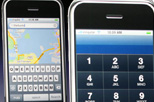Legal schmegal: Aussie iPhone will still be locked

After research conducted by two Queensland academics ignited debate yesterday over whether Apple will be allowed to lock the iPhone to an exclusive carrier, legal experts have agreed that to do so might contravene regulations, but it will make little difference to the company or its chosen provider.
Reports emerged yesterday that Apple may be in violation of Australia's competition and trade practices laws by locking the iPhone to a single carrier, based on research conducted by Queensland University of Technology (QUT) legal academics Dr Dale Clapperton and Professor Stephen Corones late last year.

The research, published in the QUT Law and Justice Journal, indicated that Apple could run aground in any attempt to lock the iPhone if found to be engaging in "third-line forcing" under the Trade Practices Act.
According to the research, third-line forcing occurs when "company A sells product A on the condition that the purchaser also acquires product B from company B, or company A refuses to sell product A because the prospective purchaser would not agree to acquire product B from company B".
"Forcing consumers to deal with third-party companies for unrelated products and services is a fundamentally bad thing for competition, it would be like Ford deciding that from now on all of the cars they produce can only use be used with petrol from Shell," Clapperton said.
"Whether the iPhone supply breaches the third-line forcing prohibition depends quite a bit on how the device is sold," said Robert Neely, trade practices expert and partner at Sydney based law firm Henry Davis York.
"It is third line forcing and an automatic breach of the Trade Practices Act to supply one product -- in this case the iPhone -- on the condition that the purchaser acquire another product -- mobile telephony services -- from another organisation."
Ayman Guirguis, partner at law firm Blake Dawson Waldron, told ZDNet.com.au that while third-line force is "automatically illegal" under Australian trade practices law, it is a highly contentious issue, as many large companies engage in deals with consumers that could be construed as third-line force infringements.
"The case in point would be petrol vouchers. If you shop with a certain supermarket, by spending a certain amount you're entitled to four cents off a litre of petrol at the pump with its aligned supplier," said Guirguis.
"It's also extremely common within the telecommunications sphere where a customer is bound to a certain network based on the fact that the carrier incurs the initial cost of the phone itself," he said.
While the QUT report acknowledges such deals, it indicates that if Apple launched the iPhone in Australia using the model it employed in the US -- where the iPhone is locked to carrier AT&T and users pay a fee for the device, as well as signing up to a mobile service contract -- then potential carriers in Australia would most likely not be covering the cost of the device as part of a plan, leaving Apple still open to a third-line forcing violation.
The report states: "Where the carrier has not subsidised the cost of the phone, there seems to be no legitimate pro-competitive justification for locking the phone to the services of that carrier, especially where that locking is permanent and not just for the duration of the initial contract."
"If Apple enter into an exclusive agreement with any particular carrier then it would be a matter for the ACCC as to whether that agreement was anti-competitive and contravened the Trade Practices Act," said QUT's Clapperton.
Blake Dawson Waldron's Guirguis said that the necessary exception to avoid an infringement under the law is that Apple seek approval to lock the device from the ACCC in advance, as the authority has discretionary powers allowing it to weigh up whether the "public benefit of such a practice offsets the anti-competitive detriment", as is the case with supermarket fuel vouchers.
"If it is third line forcing the ACCC doesn't have to decide anything, it is an automatic breach of the act unless the parties lodge a notification," said Henry Davis York's Neely.
Despite this, Guirguis said the scenario is only based on speculation at this stage and "we will have to wait and see how it plays out".
An ACCC spokesperson said the regulator would not comment "on matters we might or might not be investigating, nor on any speculation relating to these matters".
AAP contributed to this story